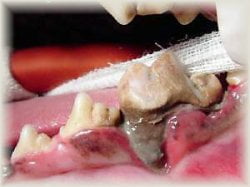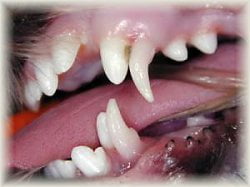Periodontitis, inflammation of the tissues and structures surrounding the teeth, not only causes bad breath but also pain, discomfort and potential tooth loss. It is not normal for your pet to have an offensive odor in his/her mouth which is why you need a consultation on pet dentistry services. The byproduct of bacteria produces this foul odor. Dental disease generally begins with inflammation of the gums and accumulation of plaque on the teeth. Plaque is formed when bacteria combine with salivary debris. Tooth loss, gum bleeding and pus between the teeth or at the gum line are indicators of advanced periodontal disease. A pet with periodontitis can send a bacterial shower into the bloodstream every time they chew. In turn, these bacteria can potentially affect the heart valves, lungs, liver and kidneys.
A thorough oral exam is one of the most important parts of our physical exam. Many of our clients are surprised when we point out dental disease in their pets. Clinical signs of disease may include bad breath, excessive salivation, appetite changes, facial swelling, weight loss, pawing at the mouth and behavioral shifts. We always recommend home dental care and, if needed, professional dental care for your pets. Recommendations depend on severity.
Home dental care is a classic example of preventative medicine.
We can’t change the genetic code of your pet, but we can significantly slow the progression of dental disease through home care. We educate all puppy and kitten owners on basic teeth-brushing techniques as part of routine grooming and training. Daily teeth brushing is ideal. It takes 6-8 hours for bacteria to attach to the tooth’s surface. The bacteria then absorb calcium from saliva and become mineralized, forming tartar or calculus. This is why brushing is recommended daily, to continually break this cycle. While brushing a few times a week is helpful, brushing weekly does not significantly inhibit the formation of calculus. Do not use human toothpaste when brushing your pet’s teeth. The toothpaste may cause tummy upset and the fluoride levels can be toxic to their kidneys. We recommend and sell CET enzymatic toothpaste, in poultry and mint flavor.



Though there is no substitute for brushing, as it mechanically breaks up the plaque film, there are other home care options when brushing simply is not possible. These include wiping the teeth with medicated wipes, rinsing the mouth with an antiseptic prescription rinse and lastly using chews, such as CET Chews and Greenies. While calculus is reduced by chewing on hard crunchy foods and treats, real bones, rocks and even ice can cause fractures of the teeth, and are best avoided.
We can assume that dental disease causes pets significant chronic pain, just as it does in people. Recognizing the critical link between dental care and pet wellness, Vetcetera has invested in leading-edge dental instrumentation (including dental x-ray) and advanced dentistry training. It is thrilling to see the dramatic improvements in pets we have treated for advanced dental disease. Their activity levels, appetite and attitude often improve significantly.
We would be glad to discuss specific recommendations for your pet, in both the professional and home care realm. We can determine upon exam the need for a prophylactic cleaning (to prevent disease) or periodontal therapy (treatment of current disease) and provide an estimate accordingly.
As a rule, smaller breed dogs and cats are more prone to periodontal disease than large breed dogs due to crowding of teeth in the mouth.
The interval between professional cleanings varies based on the same factors that influence development of disease. Some dogs and cats need annual cleanings while some may go a lifetime without the need for this procedure.
The adult cat has 30 teeth; the adult dog has 42. Our wellness goal at Vetcetera is to educate owners to care for each of these teeth over the lifetime of their pet. Dental care isn’t costly, but dental disease is.
Do you have questions about pet dentistry? Click on the button below to visit our Pet Dentistry FAQ page where you can learn more.
Dentistry FAQs
